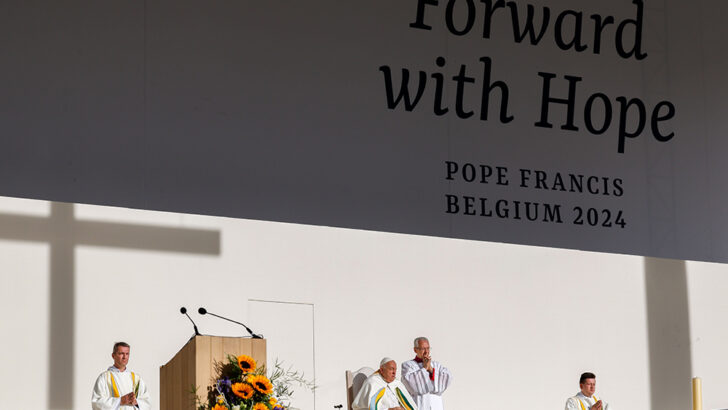Pope Francis received ‘a frosty welcome’ at the Catholic University of Louvain for his praise for the role of motherhood in history, adding “what is characteristic of women, what is feminine is not determined by consensus or ideologies. It is not written on paper, but in the flesh.” Louvain expressed ‘incomprehension and disapproval’ at Francis’s words, calling them “deterministic and reductive.” They wanted to hear more about women as theologians and less of trad ‘gender roles’.
I read the Papal speech on my eldest son’s fiftieth birthday, when I was reflecting on the experience of being a mother, and how it had influenced my life. And I have come to realise that my entire life has been sharply divided between ‘before’ and ‘after’ motherhood. The experience of having a child completely upended everything I had thought, done and imagined before. My worldview underwent a total revolution.
You will worry about this person you have brought into the world. Every single day”
I see similar reactions occurring to younger women today, and I understand exactly why. In modern times, young women assume they will have the same freedoms and opportunities as men in their work, habits, ambitions and lifestyles. And, for the most part, they do, which is all fine and dandy.
Until the day they give birth to a baby: and then, with all the force of nature, the extraordinary role of maternity hits with maximum impact. This is something that has altered you, body, mind and spirit. Life changes forever. “Until you go down into the grave,” a friend told me, “You will worry about this person you have brought into the world. Every single day.” What a responsibility!
Motherhood
Young women today are, arguably, less prepared for this immense change of coming to motherhood. Families are smaller, so they may not watch older siblings, or cousins, experience birth and its aftermath. The freedom and equality that young single women now expect can be thrown into such unexpected disarray: recovering from childbirth, or breast-feeding, you realise you can’t rush off to report a war zone or take the same risks as before. Nor can you, usually, stay up all night clubbing. This comes as a surprise!
The laws of nature run deep and are written in the flesh. This natural force strikes, and strikes fiercely”
Pope Francis is 87 years old and from a Latin culture: it’s perhaps predictable that he venerates femininity and motherhood. Though he must surely recognise that millions of women have had fulfilled and rewarding lives without being mothers – so many nuns, teachers, medics, scholars and saints, too.
But he is not wrong – pace progressive Louvain – to insist that the laws of nature run deep and are written in the flesh. This natural force strikes, and strikes fiercely, when this tumultuous event occurs in a woman’s life.
*
Ian d’Alton, a much-respected Irish Protestant, has written a book, out next month, aptly named Southern Irish Protestants: Histories, Lives and Literature. I look forward to it: this minority forms a significant element in Irish history, and especially literature (Yeats, O’Casey, Synge, Beckett). In Sandymount, Dublin, where I grew up, there was a sense of neighbourly ecumenism even before the official version appeared.
It’s interesting to note that in current Irish literature – especially novels written by ex-Catholics – Protestants often appear as admirable and kindly folk, in contrast to the Catholic sleeveens who are sly and cowardly. This is a feature in Claire Keegan’s very successful Small Things like These (the movie due soon), in which the only decent person is an elderly Protestant lady. It’s a similar picture in Sebastian Barry’s Old God’s Time. The slithery character of Irish Catholics, with their horrible Sacred Heart images – as opposed to the relatable Irish Protestants – is also a theme in John Banville’s work.
Mr d’Alton’s book is with the vibe of the times! I wish him success with it.
*
I’ve been offered a Covid inoculation this month, and I honestly don’t know whether to have it, or not. Yes, I am somewhat influenced by reports of – admittedly unusual – deaths from the jab. I also have a knowledgeable friend who genuinely believes that Covid is a conspiracy dreamed up by Big Pharma, who urges me to refuse – she reels off the stats persuasively. I didn’t get jabbed last year, and didn’t seem to catch Covid (though one can have the infection without knowing, and a few days with a chesty cold and an unpleasant strep throat may hide it). While family members of mine who got the injection nevertheless did catch Covid – several times.
But is it irresponsible not to avail of the inoculation? Is risking a bout of the lurgy also putting others at risk? And since I have a mild respiratory condition already, am I being cavalier with my own health?
And yet – could it be quite reasonable to let the body fight infections, and let the immune system do its work? Over-medicalisation is not healthy either.
So I cogitate over the conundrum.


 Mary Kenny
Mary Kenny Pope Francis celebrates Mass at King Baudouin Stadium in Brussels, September 29, 2023. Photo: CNS/Lola Gomez
Pope Francis celebrates Mass at King Baudouin Stadium in Brussels, September 29, 2023. Photo: CNS/Lola Gomez 